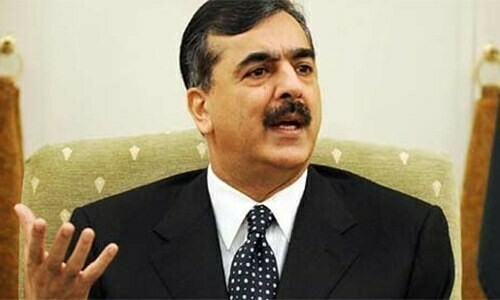AFTER a long hiatus, Iran is again sitting across the table from the P5+1 (Germany) in Almaty for talks covering its nuclear programme plus related issues. Both sides have dampened expectations of significant progress in these talks.
Indeed, the positions of the parties remain wide apart. The principal declared objective of the six major powers is to secure a complete halt in nuclear enrichment by Iran as demanded by several resolutions of the Security Council. They do not expect Iran to accept this demand anytime soon.
The more proximate aim is to get Iranian agreement to stop enriching uranium over five per cent; transfer the higher (20 per cent) enriched uranium in its stocks out of Iran; and allow International Atomic Energy Agency (IAEA) inspections of any of Iran’s facilities suspected of being involved in nuclear weapons activities. In exchange, the major powers reportedly would offer some easing of the sanctions imposed against Tehran, so that it can, for example, purchase spare parts for its civilian aircraft.
Iran’s position remains that: it does not seek nuclear weapons; it has the right, under the Nuclear Non-Proliferation Treaty, to enrich uranium; and the talks with the six powers should cover not only the nuclear issue but also those issues raised by Iran.
For the past several months, Iran held back from resuming the talks because of the escalation of unilateral Western sanctions and the threat of a military attack espoused by Prime Minister Netanyahu of Israel and some American “hawks”. It responded robustly to cyber attacks, drone surveillance and sabotage.
Last September, at the UN General Assembly, the Israeli prime minister stepped back from the threat of imminent attack, under heavy pressure from the Obama administration and dissension within Israel’s security establishment.
Some of Iran’s calibrated actions also helped to lower the political temperature, such as turning a part of its higher (20 per cent) enriched uranium into fuel rods (thus making this unsuitable for a nuclear weapon) and holding several rounds of exchanges with the IAEA on broader inspections (although not agreeing to such inspections prior to the Almaty talks). The major powers were encouraged by the choice of the venue for the talks. Kazakhstan is one of only three countries — the other two being Ukraine and South Africa — which have given up their nuclear weapons.
Although, as expected, the Almaty talks last month did not yield a dramatic breakthrough, the agreement to continue the process indicates mutual flexibility.
The Western media’s assertion that Iran was compelled to return to the negotiating table by punitive sanctions was clearly false. In fact, Iran’s position has been strengthened by recent developments: Russia’s estrangement with the US; China’s leadership transition and the US pivot to Asia; the visible differences between the US and Israel and the Pentagon’s open aversion to military strikes against Iran.
Thus, in the negotiations, concessions are more likely to come from the West rather than Iran.
In his State of the Union address on Feb 11, US President Obama declared: “The leaders in Iran must recognise that now is the time for a diplomatic solution, because a coalition stands united in demanding that they meet their obligations, and we will do what is necessary to prevent them from getting a nuclear weapon.” This was interpreted as expressing US determination to resort to all options, including the use of force.
In fact, Iran itself asserts that it does not want to develop nuclear weapons. Even if this assertion is insincere, Iran is unlikely to develop a nuclear weapon until it has mastered weapons design and miniaturisation. This is unlikely to happen during the tenure of the second Obama administration.
Perhaps the most meaningful part of President Obama’s reference to Iran was the initial and operative part of his sentence: “… now is the time for a diplomatic solution...”.
In 2002, Iran, then under president Mohammad Khatami, had proposed a “grand bargain” to the US, encompassing solutions for the nuclear issue and other outstanding issues. Iran cooperated actively with the US to oust the Taliban and persuaded the Northern Alliance in Bonn to accept Hamid Karzai as the interim Afghan president.
Tehran was shocked when, in a speech to the UN General Assembly in September 2002, president George W. Bush listed Iran as a member of the “axis of evil”, together with Saddam Hussein’s Iraq and North Korea. Iran-US relations deteriorated seriously after that. A subterranean war appears to be under way now between the two countries.
Yet, President Obama’s declaration is an indication, even if guarded and coded, that the US may be prepared to revisit the concept of a grand bargain with Iran. Tehran’s cooperation could contribute to stabilising Iraq, Afghanistan, perhaps even Syria and Lebanon, as well as defusing tensions with Israel.
The price which will have to be paid is: recognition of Iran’s “right” to continue its enrichment programme — within agreed limits and under international inspection. This outcome may allow Iran to possess the capability to develop nuclear weapons; but a strategic agreement with the US would remove Tehran’s security compulsion to acquire nuclear weapons.
Even if the Almaty talks made no immediate progress, they could be historic if they help to replace the dynamic of confrontation by a sincere search for a viable “diplomatic solution”.
The writer is a former Pakistan ambassador to the UN.










































